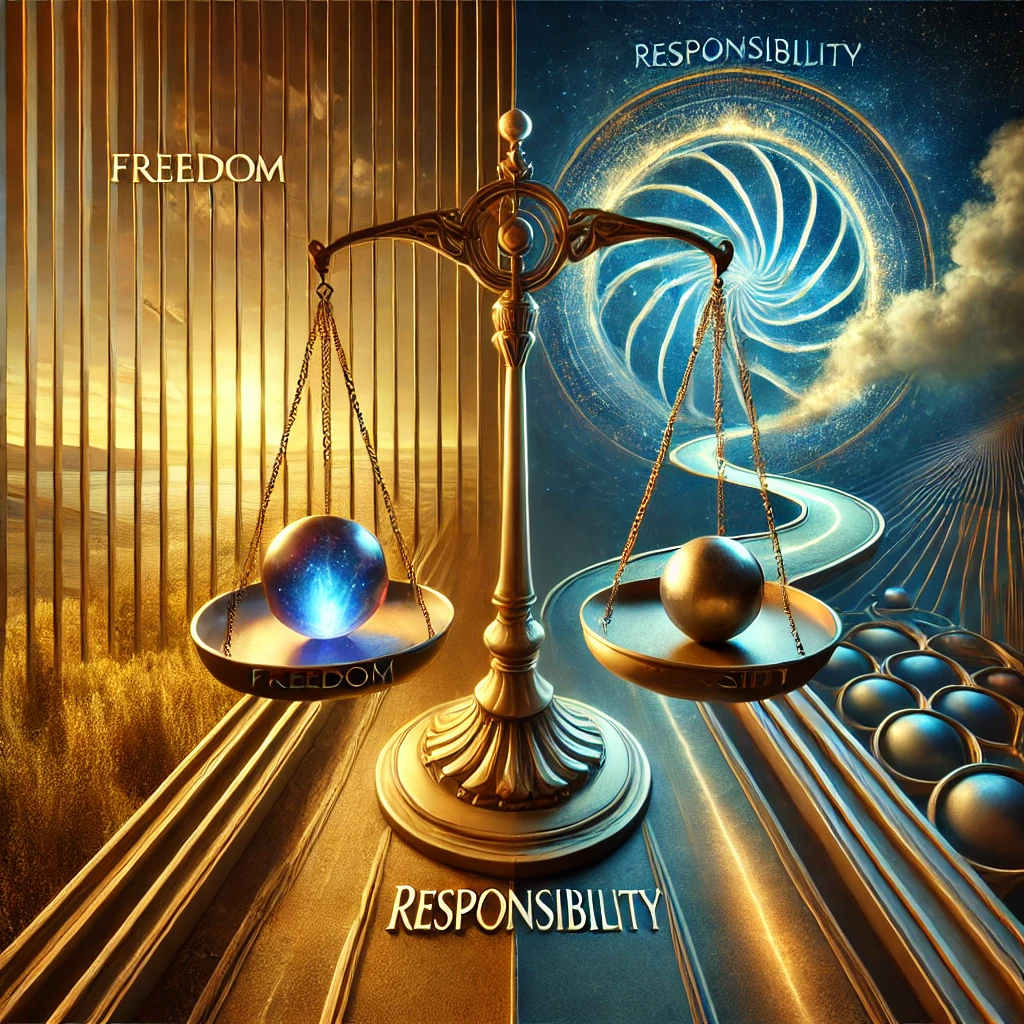Personal Development
Conclusion, life, paradox, Responsibility, Understanding
Zephyros
12 months ago
0 Comments
The Paradox of Existence: Balancing Freedom and Responsibility in Human Life
Introduction: The Dual Nature of Human Existence
Human existence is a complex tapestry woven with various threads of experiences, thoughts, and emotions. At the core of this existence lies a fundamental paradox: the tension between freedom and responsibility. As conscious beings, we are endowed with the ability to make choices that shape our lives, but this freedom does not come without a price. With every choice we make, we simultaneously accept responsibility for its outcomes and implications. This article explores how the interplay between freedom and responsibility influences human life, and how we can navigate this paradox to live more meaningful and fulfilling lives.
The Concept of Freedom in Human Life
Freedom is often seen as one of the highest aspirations of human existence. It represents the capacity to choose our path, define our goals, and pursue them according to our values and desires. However, freedom is not merely the absence of constraints or limitations; it is an active process of self-determination. As the existential philosopher Jean-Paul Sartre famously stated, “Man is condemned to be free.” This statement encapsulates the idea that we are always free to choose, even in the most restrictive circumstances, and that this freedom can be both a blessing and a burden.
Freedom as a Blessing
The blessing of freedom lies in its empowering nature. It allows us to break free from societal norms, familial expectations, or personal limitations, enabling us to pursue our own unique paths. The ability to exercise free will fosters creativity, innovation, and personal growth. When we embrace our freedom, we gain the courage to challenge the status quo and redefine what is possible.
Freedom as a Burden
On the flip side, freedom can also be a source of anxiety and uncertainty. When we are free to choose, we are also responsible for the consequences of our choices. This responsibility can create a sense of existential dread, as it places the onus on us to create meaning and purpose in our lives. The weight of this responsibility can lead to paralysis, where we become overwhelmed by the vast array of options and the fear of making the wrong choice.
Understanding Responsibility in the Context of Freedom
Responsibility is the counterpart to freedom. It refers to the obligation to answer for our actions and their impact on ourselves and others. When we exercise freedom, we are not only shaping our own destiny but also influencing the lives of those around us. This interconnectedness of human life means that our choices reverberate beyond ourselves, making us accountable for the ripples we create in the world.
Personal Responsibility
Personal responsibility entails being answerable for the outcomes of our decisions. It requires us to acknowledge our role in shaping our lives and to take ownership of our successes and failures. When we take personal responsibility, we develop a sense of integrity and self-respect, as we are living in alignment with our values and principles.
Social Responsibility
Beyond personal responsibility lies social responsibility. As members of a larger community, we have a duty to consider how our choices affect others. Social responsibility calls us to act with empathy, compassion, and respect for the well-being of others. This broader sense of responsibility is crucial for fostering a harmonious and just society.
The Paradox of Freedom and Responsibility
The paradox of freedom and responsibility arises from the interplay between these two concepts. While freedom empowers us to shape our lives, it simultaneously binds us to the consequences of our actions. This paradox can manifest in various ways:
- Freedom Requires Limits
True freedom cannot exist without limits. Paradoxically, the very nature of freedom requires boundaries. For example, if we are free to pursue our desires without any consideration for others, our freedom can become destructive, infringing on the rights and freedoms of others. Therefore, to preserve freedom, we must exercise it responsibly, with an awareness of its impact. - Responsibility Constrains Freedom
While freedom opens up a world of possibilities, responsibility narrows these possibilities by imposing constraints. Every choice we make closes off alternative paths, making it impossible to explore every option. This narrowing of possibilities can feel limiting, yet it is through responsibility that we give our choices meaning and purpose. - Freedom and Responsibility Create Meaning
Despite the tension between freedom and responsibility, it is this very interplay that creates meaning in our lives. If we were free to act without responsibility, our actions would lack significance. Conversely, if we had responsibility without freedom, we would be trapped in a deterministic world with no room for self-expression. It is the balance between these two forces that allows us to craft a life that is both meaningful and authentic.
Navigating the Paradox: Finding Balance
Navigating the paradox of freedom and responsibility requires us to cultivate self-awareness, ethical discernment, and a willingness to embrace uncertainty. Here are some strategies for finding balance:
1. Embrace Authenticity and Self-Awareness
Authenticity means being true to oneself, even in the face of external pressures and expectations. It involves a deep understanding of one’s values, desires, and motivations. By cultivating self-awareness, we can make choices that reflect our true selves, rather than conforming to societal norms or others’ expectations.
2. Accept the Weight of Responsibility
Accepting responsibility means acknowledging that our choices have consequences. This acceptance is not about self-blame or guilt, but rather about recognizing our power to shape our lives and the lives of others. When we take responsibility, we gain the freedom to learn from our mistakes and grow from them.
3. Practice Mindfulness and Reflection
Mindfulness allows us to observe our thoughts, feelings, and actions without judgment. It helps us become more attuned to the impact of our choices and the motivations behind them. Reflection enables us to evaluate our decisions and their outcomes, fostering a deeper understanding of how freedom and responsibility interact in our lives.
4. Balance Self-Interest with Altruism
Balancing freedom and responsibility requires us to consider both our own needs and the needs of others. This balance can be achieved by practicing empathy and compassion, and by striving to act in ways that benefit both ourselves and the broader community.
5. Embrace Uncertainty and Ambiguity
The paradox of freedom and responsibility often leads to uncertainty and ambiguity. Embracing these aspects of life can be liberating, as it frees us from the need to have all the answers. When we accept that life is inherently uncertain, we become more open to exploring new possibilities and finding meaning in the journey itself.
Conclusion: Living a Meaningful Life Amidst the Paradox
The paradox of existence—the tension between freedom and responsibility—is an intrinsic part of the human experience. It is through this paradox that we find meaning, purpose, and direction in our lives. By embracing both our freedom to choose and our responsibility for the consequences, we can navigate the complexities of existence with integrity and authenticity.
In the end, the challenge is not to eliminate the paradox, but to learn how to live with it. When we achieve a balance between freedom and responsibility, we gain the ability to shape our lives in meaningful ways, creating a legacy that reflects our true selves and contributes positively to the world around us.














Post Comment